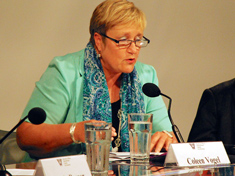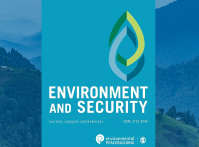-
Beyond Scarcity: Coleen Vogel on Reframing Water Security
September 12, 2014 By Moses Jackson
What exactly is meant by “water security?” Different conceptualizations of the problem can lead to different, possibly misguided, solutions, says Coleen Vogel in this week’s podcast. Vogel, professor at the University of Pretoria and a lead author of the IPCC’s 4th and 5th assessment reports, calls for reframing the water security discourse in three key ways.
What exactly is meant by “water security?” Different conceptualizations of the problem can lead to different, possibly misguided, solutions, says Coleen Vogel in this week’s podcast. Vogel, professor at the University of Pretoria and a lead author of the IPCC’s 4th and 5th assessment reports, calls for reframing the water security discourse in three key ways.
Water as Productive and Destructive
The first step is to agree on a starting point for discussion. “If we don’t have a common kind of understanding I think we could do maladaptation and not just adaptation,” she says.
Vogel advocates for the definition of water security introduced in a 2007 paper by David Grey and Claudia Sadoff:
The availability of an acceptable quantity and quality of water for health, livelihoods, ecosystems, and production, coupled with an acceptable level of water-related risks to people, environments, and economies.
This framing looks beyond the need to ensure adequate supplies and recognizes that water can also be a destructive force, she says. “It’s not just about the absence of water, but it’s also about the presence of water.”
Water’s multifaceted nature is captured in Grey and Sadoff’s typology of the “three H’s,” says Vogel, which suggests that wealthy countries have been able to “harness” its productive potential, while middle-income countries are “hampered” by hydrology and low-income countries are “held hostage” to it.
Climate Change’s Distorting Effect
Second, divergent understandings of climate change can hinder progress toward water security, she says. “We need to be framing the climate change discourse in this bigger thing called water security.”
Analyses of climate change often emphasize long-term trends and overall changes in water supply, but the more urgent concern is actually variability, she says. Rapid and unpredictable changes pose a more immediate threat and are harder for societies to absorb. “Your institutional design can’t really cope if your rate of change is being exceeded too quickly.”
Focusing too much on distant projections can also impede responses, says Vogel:
I’ve been party to so many discussions where my well-meaning climatology friends and meteorologists come into the room and they run through their simulation, the GCM model, and they switch it on and by 2070 the whole of Africa is red. And it just gets redder and redder, and you can look around the room and everyone is kind of feeling very uneasy… It’s marginalizing, because you lose your sense of agency because you think, ‘well I just can’t do anything about it.’
Technological Change vs. Social and Institutional Change
Third, the “solution space” must be expanded, says Vogel. Technological solutions to water problems are only one part of the equation but often receive disproportionate attention. “If you only look at dam storage and hydropower from that perspective and you miss out all the power dynamics that go into moving people to design the dams and so on and so forth, you’re missing a whole huge wodge of stuff that you need to be including.”
“We also need to be looking at the institutional space,” including water governance, laws, and pricing, she says. Water security cannot be achieved over the long term without integrating diverse perspectives – including not only insights from across the social sciences, but also local and traditional knowledge, which often go overlooked.
“Unless we open up that trans-disciplinary space really wide and fully, I don’t think we’re really going to do much,” says Vogel. “I think we’ll just be doing business as usual, spending a lot of USAID money.”
Vogel spoke at the Wilson Center on August 20.
Friday podcasts are also available for download on iTunes.
 A Publication of the Stimson Center.
A Publication of the Stimson Center.







